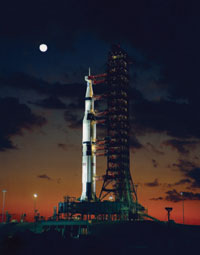

NJIT Campus Center Atrium
Historians usually depict the space race of the 1960s and 1970s as a pitched technological battle between Cold War political rivals. Yet while U.S. and Soviet spacecraft forced the world to look upward towards the Moon, they also, quite ironically, encouraged citizens across the globe to gaze back down at “spaceship Earth” with a newfound environmental awareness.
In his Technology and Society Forum presentation, historian Neil Maher will not only explore this environmental history of the space race, but perhaps more importantly, argue that it influenced, and ultimately co-opted, the divisive politics of the “long 1960s,” including those of the Civil Rights, Women’s, Environmental, and anti-Vietnam War movements. The ultimate goal of Maher’s current research in this area is to focus attention not only on the historic significance of NASA, but more importantly on how the space race and nature’s role within it shaped the politics and culture of post-World War II America.
An associate professor in the Federated History Department, Maher teaches environmental and political history. He has published articles in journals that include the Western Historical Quarterly, Environmental History and the Chronicle of Higher Education, edited a collection of essays by historians, scientists, and policy analysts titled New Jersey’s Environments: Past, Present, and Future (Rutgers University Press, 2006), and co-edited a special issue of the Radical History Review titled “Transnational Environments: Rethinking the Political Economy of Nature in a Global Age” (Duke University Press, 2010). In January of 2008, Oxford University Press published his book, Nature’s New Deal: The Civilian Conservation Corps and the Roots of the American Environmental Movement, which received the Charles A. Weyerhaeuser Book Award for the best monograph in conservation history.
Download the flyer (756 KB, pdf)
NJIT welcomed attendees from all area colleges, universities, and professions.
Sponsors:
Albert Dorman Honors College
NJIT Technology and Society Forum Committee
Federated History Department
Sigma Xi